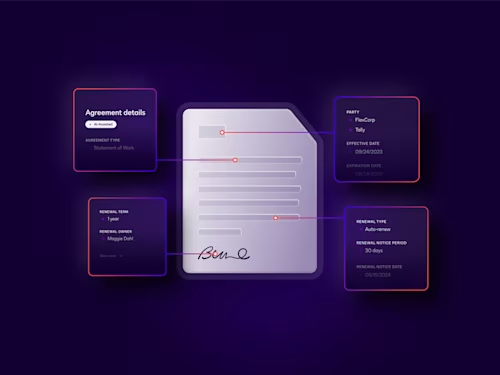
How State and Local Agencies are Using Remote Online Notarization
How remote online notarization technology is being used in three key areas of state and local government.

From court filings to right of way agreements, notarized documents are essential to completing key government agency transactions.
Today, most notarizations are paper-based and are conducted in person. This requires scheduling an office visit for multiple constituents, and wait times for documents to be printed and prepared.
However, in recent years that has begun to change, with the acceptance of remote online notarization (RON). The demand for RON is also accelerating as more and more government agencies transition to supporting employees with a hybrid work environment. State legislatures are also passing permanent RON laws and regulations.
Now’s the time for a better and more modern notarization approach that avoids delays, enhances the constituent experience, and preserves an auditable record of the notarial transaction.
Why state and local agencies are adopting RON
With Docusign Notary, state and local employees can conduct remote online notarizations securely and efficiently by leveraging Docusign’s trusted eSignature platform. It also allows state agencies to better and more efficiently meet the needs of citizens. Using Docusign Notary, agencies can:
Delight constituents with convenience: Notary helps agencies meet constituents’ growing expectations for convenient, digital experiences.
Reduce turnaround times: Eliminate logistical challenges associated with onsite signing to help ensure documents are notarized quickly and accurately.
Ensure reliable identification: Government agencies can be confident that their notaries public are accurately and reliably identifying signers.
Preserve the record: Government officials can securely store and readily access clear, complete, and audit-ready documentation of every notarization.
How RON is being used in three key areas of government
State and local agencies can start modernizing their notarization processes today, using remote online notarization. Some of the highest impact areas include:
Right-of-way easements
Anytime construction work needs to occur, especially related to work done on electrical transmission lines, wastewater, oil and gas pipelines, a right-of-way easement is granted or reserved over the land where the work is happening. When the department of transportation is doing maintenance or expansion of existing services, they need to request a right of way to access private land.
This process typically requires a notary, where the right-of-way easement is prepared and signed in front of a notary for the record. In addition, this involves landowners who need to fill out a form with information that matches the information that is on their deed. Errors or missing information can lead to a rejection and start the process all over.
Once the document is ready to be signed by a notary, logistical challenges associated with onsite signing can cause further delays.
The benefits of Docusign Notary for right-of-way easements include easy-to-use fields and templates that make it easy for government notary staff to efficiently prepare documents to be signed and notarized digitally. Notary also reduces the risk of “not in good order” agreements and manual errors with Notary-specific drag-and-drop-fields to help ensure proper document execution.
Legal documents
An affidavit is a sworn statement that can be used in a court of law, and may be required for documents in either criminal or civil proceedings.
Virtually every legal jurisdiction requires affidavits and written testimonies to be authorized prior to submission as evidence in a court of law. Most states also require common legal agreements like living wills and powers of attorney to be notarized.
The most common court document that requires a notary is an affidavit, and most courts won't accept filed affidavits that haven't been notarized.
Power of attorney is another common legal document that gives another person, the agent, the authority to act on the principal's behalf. Notarized affidavits also absolve the individuals who signed from testifying in court to confirm their validity, so the identity of the signer is extremely critical.
Docusign Notary helps to mitigate the risk of identity fraud by using both identity verification and knowledge-based authentication in a single platform. Notaries public also have the option to personally attest to the signer’s identity, per certain state legislations. Notary also helps to reduce risk while meeting state remote online notarization requirements.
Secretary of State and City Clerk offices
In at least 35 U.S. states, the Secretary of State is responsible for the administration of notaries public, and therefore determines which documents (e.g. legislation, state contracts, or other official documents) require the notary seal.
With so many documents that go across different departments, it’s important for the city clerk to be able to track these in a central repository.
Docusign Notary allows notaries to preserve a robust audit trail of every notarial transaction. This includes a Certificate of Completion for each notarial transaction as well as long-term storage of the encrypted audio-visual recording and electronic journal for the notary public within Docusign.
Tips for getting started with Docusign Notary
First, understand the legal requirements for RON in your state. Here’s the full list of Notary-supported states in the U.S. From there, speak with your legal and business development team to get things started.
For example, the city clerk at the City of Olympia gained approval for using RON from the city’s legal department. He also gained buy-in from the ground up across all city departments. This resulted in a city-wide implementation for use by all personnel in contracts, legal, permitting, as well as the city manager's office.
Learn more about Docusign Notary here. Or, if you’re ready to streamline your agency’s notary capabilities with remote online notarization now, contact sales.
Related posts
Docusign IAM is the agreement platform your business needs


